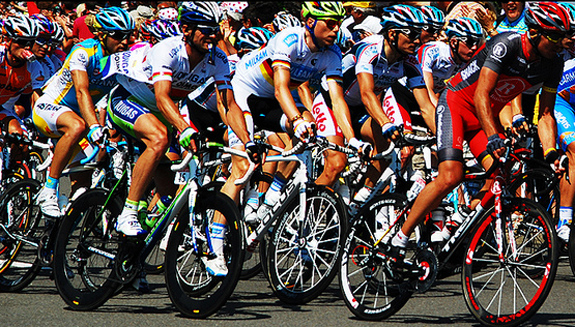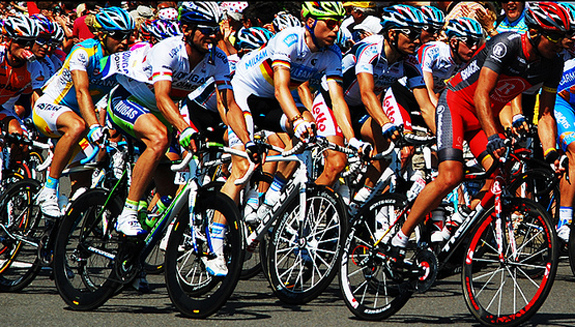Le Tour de France of LSAT Studying
- by
- Jul 30, 2011
- LSAT, Sports
- Reviewed by: Matt Riley


The Tour de France officially ended this week. Comprised of three grueling weeks over varied terrain including the French Alps and Pyrenees, it is the most prestigious bicycle race in the world. You might be familiar with the tour from one Lance Armstrong, who won the tour a world-record seven times with only one testicle. Which is why he’s such a badass. (Also because he dated Sheryl Crow).
Anyhoo.
I find watching the tour every year a riveting experience, and this time around was no different. From Dutch cyclist Hoogerland getting hurled into a barb wire fence to the first time stage win by America sprinter Tyler Ferrar, it was packed full of excitement.
So what does the Tour de France have to do with the LSAT, you might wonder? My first response is that I wanted to prize something worthwhile from three weeks of sitting on the couch watching a bicycle race. The second is that I gleaned some important lessons from the tour that I think will serve you well as you prepare for the LSAT.
It’s not about specialization
There are many skills that go into being a successful tour cyclist. However, the eventual winner of the Tour de France is not a specialist. It’s not enough to be good at sprinting alone like Mark Cavendish, or a time trial specialist like Tony Martin. They may win stages, but they’ll never win the entire race.
To win the tour, a cyclist must know how to climb well, navigate downhill, how to turn expertly, as well as knowing when to conserve energy and when to expend it.
In the same, way, the LSAT isn’t about focusing solely on games or logical reasoning or reading comprehension. I’ve seen many students devote a huge amount of time to logic games, when in fact this only comprises a bit less than 25% of the test. Your ultimate LSAT score is determined by how well you do on every section, so you can’t afford to neglect anything.
You have to put in the work
I also found on the tour that it’s the contestants who prepared for the tour that fare the best during the race. My favorite bicyclists – the Schleck brothers from Luxemburg, lost the race and came in 2nd and 3rd because of the time trial on the second to last day. This was not a surprise to anyone, because the Schleck’s don’t practice time trialing vigilantly. They focus on the mountain stages and hope the time they gain there will be sufficient to win the day.
So no matter how much I like Andy Schleck or was moved by the embrace he shared with his brother after learning that he lost the race, it’s important to learn a lesson from him. Be sure to do your LSAT homework diligently – otherwise, how can you hope to perform well on test day?
Pacing yourself
Last year’s winner Alberto Contador came into the tour fresh off another race, the Giro D’Italia – and was predictably exhausted by the end of the Tour de France. The LSAT equivalent is to take practice test after practice test in the week(s) leading up to the LSAT. The moral of Contador’s story? First, don’t think you’re awesome because you beat Lance Armstrong when Lance was almost 40. The man won the tour seven times. With one testicle. Second, don’t exhaust yourself before the exam by practice examing yourself to death. Keep consistent pacing with homework and practice exams throughout the months leading up to the LSAT by forming a study schedule and sticking to it.
So what have we learned from the Tour de France? First, don’t focus on a few skills to the exclusion of everything else. If you hate doing RC because you’re not terribly good at it, this means you have to focus on it MORE, not less. Second, make sure you put in the time to learn the methods and practice them so they’ll be automatic on test day. In other words, do you homework. Finally, pace yourself because the LSAT, like the tour, is a marathon, not a sprint. Unless you’re Mark Cavendish. But let’s face it; he’s kind of a prick.
Search the Blog

Free LSAT Practice Account
Sign up for a free Blueprint LSAT account and get access to a free trial of the Self-Paced Course and a free practice LSAT with a detailed score report, mind-blowing analytics, and explanatory videos.
Learn More
Popular Posts
-
logic games Game Over: LSAC Says Farewell to Logic Games
-
General LSAT Advice How to Get a 180 on the LSAT
-
Entertainment Revisiting Elle's LSAT Journey from Legally Blonde








